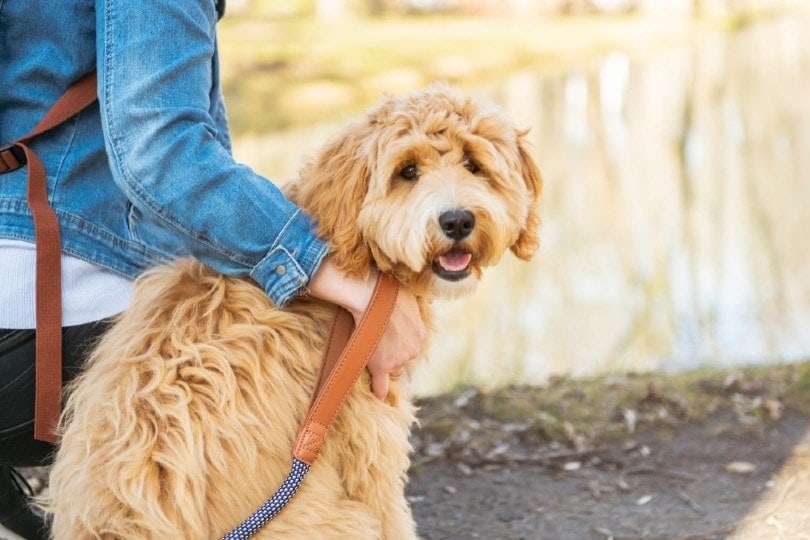Boston Spaniel (Boston Terrier & Cocker Spaniel Mix): Picture, Facts & More

Updated on

Click to Skip Ahead
The Boston Spaniel is a hybrid dog breed that crosses the Boston Terrier and the Cocker Spaniel. It is a medium-sized dog with a medium-length coat. They get along with family members, don’t tend to be loud unless left alone for long periods, and enjoy plenty of time outdoors adventuring. The breed is somewhat prone to separation anxiety so it may not be the best choice of companion pet for families that work all day or leave the house for long stretches.
Because the Boston Spaniel is a hybrid, you may get any combination of physical features and emotional characteristics of the two parent breeds, however.
Breed Overview
| Height: | 12–17 inches |
| Weight: | 10–30 pounds |
| Lifespan: | 10–14 years |
| Colors: | Black, brown, white |
| Suitable for: | Active owners that don’t work all day |
| Temperament: | Loving, intelligent, playful |
While the Boston Spaniel is not a recognized breed, and, therefore, there are no breed standards or much breed history to go on, the Boston Terrier is one of the most popular breeds in the U.S. and the modern Cocker Spaniel breed dates back to around the mid-19th century.
You may end up with a dog that is closer to either parent breed or, more likely, one that takes traits and attributes from both.
Boston Spaniel Breed Characteristics
Boston Spaniel Puppies
While the Boston Terrier and Cocker Spaniel are popular breeds, the Boston Spaniel is not yet a popular hybrid. This means that you might find it difficult to find breeders offering this cross.
Contact breeders of the parent breeds and ask if they know of any litters, or join social media groups dedicated to the group.
When you do find a breeder, do your due diligence before buying. Ensure you see the premises where the puppies are raised and meet at least the mother dog. Determine whether the puppies are first-generation Boston Spaniels or if they are subsequent generations. When meeting the puppy, it should be alert without being too excitable. It should look healthy and it shouldn’t be lethargic or cowering behind its mother.
Because this isn’t a popular, or expensive, breed, you may find Boston Spaniels in rescues. Adopting can cost less than buying from a breeder, and while you might not be able to ascertain the dog’s exact history, the rescue should have a good idea of its temperament.
Most will have completed checks to see whether it is good with other dogs, cats, and people. You can also meet the dog and, if you have other dogs in the house, you should be able to have your existing dog meet the new dog to make sure they will get along.
The puppy will be lively and energetic. As both parent breeds are intelligent dogs, the hybrid should be intelligent and will be easy to train when it is young. As well as teaching basic manners and some commands, you should also socialize your puppy. The Boston Spaniel is a confident dog but socialization is still important because it introduces young dogs to new people and new situations. It will bear fruit for you and your dog further down the line.

Temperament & Intelligence of the Boston Spaniel🧠
The Boston Spaniel is a generally happy, playful, and affectionate little dog. It can do well living in an apartment or a property with its own yard and outdoor space, but this medium-sized dog will have high energy levels and will need regular exercise to meet those needs.
It can also suffer from separation anxiety, so it may not do well with owners who are out at work all day. If you do work all day, you will need to start getting a Boston Spaniel used to being left alone. Start by leaving them for a few minutes a day, and then increase this over time.
If you can’t pop home halfway through the work day, consider getting a family member or professional dog walker to stop in and visit your Boston Spaniel.
Although the Boston Terrier is not prone to being overly vocal, the Cocker Spaniel can be, so whether your dog is prone to barking incessantly or not will depend on which parent breed it most closely resembles.
Are These Dogs Good for Families? 👪
Because they get along well with children, as well as adults and even strangers, the Boston Spaniel is considered a good family dog. They will bond with all family members and will be especially close to those who walk them, play with them, or feed them. The breed will want to be part of all family activities, whether in the house or out of it.
They also get along with strangers and aren’t prone to barking or mouthiness, so while they will want to play with children and their friends, they shouldn’t cause too much mischief.
Does This Breed Get Along with Other Pets? 🐶 😽
Similarly, the Boston Spaniel is known to get along with other animals, both in the house and out of it. Introductions to other pets should always be gradual and are best done when both pets are young, but this isn’t always possible. Although the Boston Spaniel should get along with cats and dogs, you should never leave a dog unattended with smaller animals like hamsters or rats.
Things to Know When Owning a Boston Spaniel
The Boston Spaniel makes a good family dog for those who have time to give them exercise, training, and socialization. They will get along with all family members, as well as other pets, and will usually be friendly with strangers. However, they do require plenty of exercise and mental stimulation and can suffer from separation anxiety if left alone for long periods, so while they are good pets for most families, they may not be the best choice for all homes.
Food & Diet Requirements 🦴
The Boston Spaniel is an energetic, medium-sized dog. They will usually eat between two and three cups of dry kibble per day and should always be given unrestricted access to fresh drinking water. If you choose to feed canned or wet food, follow the guidelines on the packet to ensure that you feed an appropriate amount.
You can also feed a combination of dry kibble and canned food, but will need to adjust the amount you feed of each. If you give treats or use treats for training, ensure they are healthy treats, and take the caloric content and other ingredients into account when calculating daily feeding volume.
Exercise 🐕
The Boston Terrier and the Cocker Spaniel are energetic dogs, and you can expect the cross to be energetic too. You will need to provide at least an hour of exercise each day. The breed’s intelligence and alertness mean that it can do well in agility and other canine sports classes, and these present a good opportunity to exercise your dog and provide mental stimulation.
Training 🎾
The Boston Terrier is known for being an intelligent dog and considered easy to train when it is a puppy. It has a very low prey drive and isn’t prone to biting or mouthing, but if a Boston Terrier senses freedom, it will make a break for it and can be difficult to coax back.
The Springer Spaniel is also an intelligent breed. Unlike the Boston Terrier, they can develop a tendency to be vocal, so one of the first commands you will want to work on will be the “quiet” command.
As a cross between these two breeds, the Boston Spaniel is considered an intelligent breed that is easy to train, although, as with any breed, will be easier to train as a puppy. They will benefit from the use of positive training, generally responding better to pleasant praise rather than harsh scolding.
Grooming ✂️
The medium-length coat of the Boston Spaniel will take some care, although grooming shouldn’t take over your life. Brush the coat at least three times a week, and ideally daily during shedding season. This will remove dead hairs and help prevent matting of the fur so it will benefit you and your dog.
Nails will need regular trimming, typically every 2–3 months, depending on how often your dog gets walked and the type of surfaces they walk on. It is time to clip the claws when you can hear them clicking on hard floors.
Brush teeth three times a week, or daily, even if you feed hard kibble and give regular dental treats. Dental hygiene is important to dogs and tooth decay and other dental problems are among some of the most common ailments faced by adult dogs.
Health and Conditions 🏥
Although it is impossible to predict whether any dogs will get ill throughout their life, certain breeds and types of dogs are more prone to certain conditions. Although the risk of hereditary conditions might be lowered by so-called hybrid vigor, there are still some conditions that the parent breeds are prone to, and you should keep an eye out for them.
In particular, the brachycephalic shape of the Boston Terrier’s face means they can be prone to breathing problems, so if your Boston Spaniel has this facial shape, you will need to look out for this.
- Allergies
- Eye Conditions
- Cataracts
- Reverse Sneezing
- Brachycephalic Respiratory Problems
- Deafness
- Idiopathic Epilepsy
Male vs Female
The male Boston Spaniel may grow to be a little taller and heavier than the female. Males are more prone to wanderlust and can be more boisterous, especially if they are not neutered. However, the individual character is more likely to determine the traits of an individual dog than its sex.
3 Little-Known Facts About the Boston Spaniel
1. The Boston Terrier Is Known as the “American Gentleman”
The Boston Terrier was first bred in the late 19th century. It likely combined Bulldogs and English White Terriers and was initially used as a dog-fighting breed. The breed had several names before being called the American Bull Terrier, then the Boston Bull Terrier, and, finally, the Boston Terrier: named for the city where it was first bred.
The distinctive markings have earned the breed the nickname of the American Gentleman because it looks as though it is wearing a tuxedo.
2. Boston Terriers Are Prone to Gas
The brachycephalic shape of the Boston Terrier’s face can lead to several health conditions, and owners need to look out for signs of breathing difficulties. Another common problem caused by the unusual features is that the Boston inhales a lot of air when swallowing. It is also prone to reverse sneezing, which causes yet more air to be ingested.
The result of all this extra air ingestion is that the breed can be prone to gassy outbursts!
3. Springer Spaniels May Have First Landed in America on the Mayflower
The Springer Spaniel hails from England, where it was bred as a working dog. Specifically, it would spring game birds out of their hiding places and would also be used to retrieve downed birds for hunters. It is possible that one of the first Springer Spaniels in the U.S. came over on the Mayflower in 1620. Ship manifests indicate there were two dogs on board: a Mastiff and a spaniel breed.
Final Thoughts
The Boston Spaniel combines the Boston Terrier and the Springer Spaniel. The resulting cross is an intelligent dog that is medium in size. It is considered an intelligent breed that should be easy to train when a puppy. They should also get along with people, other dogs, and even cats, although this does depend on the character of the individual dog as well as how well the dog was socialized as a puppy.
Featured Image Credit: ohmmzz, Shutterstock













